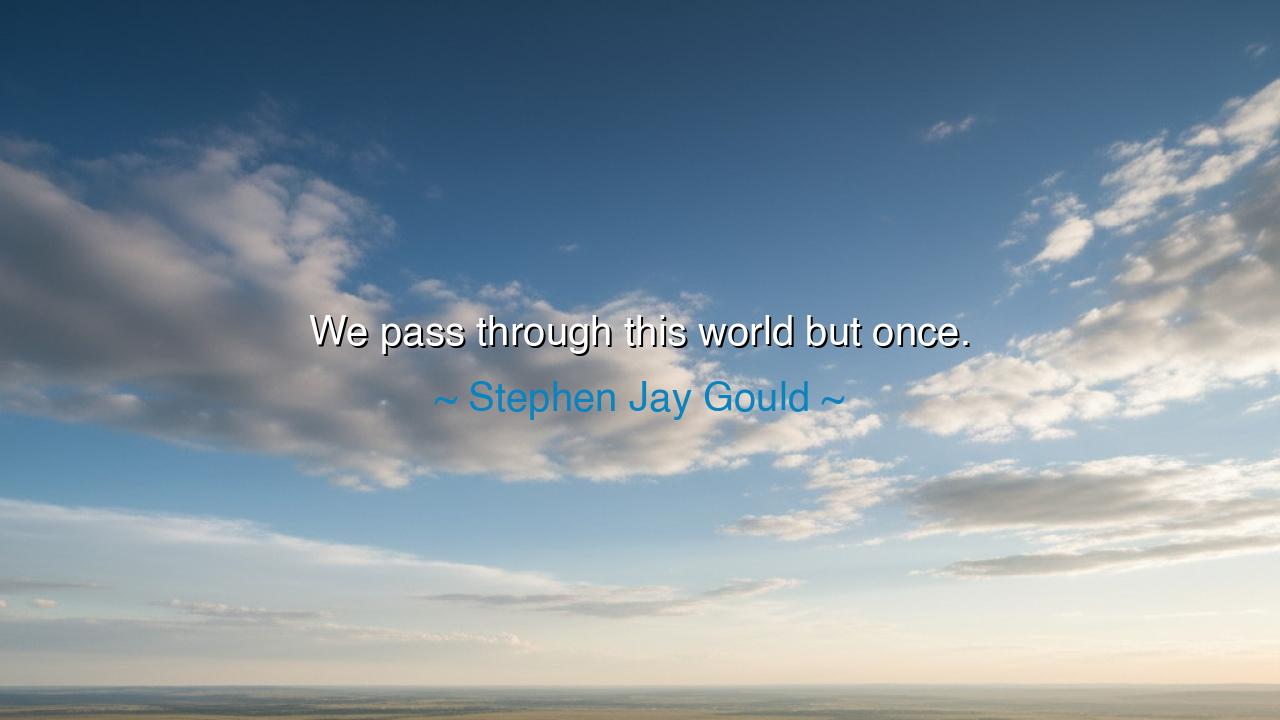
We pass through this world but once.






When Stephen Jay Gould, the great scientist and philosopher of life’s impermanence, declared, “We pass through this world but once,” he spoke with the quiet gravity of one who had peered into both the vastness of time and the fragility of existence. His words carry the rhythm of eternity and the tenderness of mortality. They remind us that life — brief, brilliant, and irreplaceable — is a sacred crossing, a single flame flickering against the endless dark. To pass through this world but once is to understand that each moment, each breath, each act of kindness or courage, is both gift and responsibility.
The origin of this quote lies in Gould’s reflections as a scientist of evolution and as a man deeply aware of his own mortality. Born in the twentieth century, he studied fossils and the long march of life across the ages. He saw that the earth has turned for billions of years, that countless species have risen and vanished, and that humanity’s time — though bright — is but a heartbeat in the cosmic symphony. From that vision came his reverence for the fleetingness of human life. When he said we pass through this world but once, he was not lamenting the brevity of existence, but honoring its rarity. To live, even for a moment, amid the vast silence of the universe, is miracle enough.
In his words we find the echo of the ancients — of Marcus Aurelius, who wrote, “Do not act as if you had ten thousand years to throw away.” The Roman emperor and the modern scientist, though centuries apart, speak with the same voice: that life’s brevity is its holiness. To live only once is not a curse but a command — a summons to live awake, to pour one’s soul into the present, for there is no return. The wise do not waste their days in regret or idleness, but fill them with meaning, for they know that every sunrise is one fewer they shall see.
Consider the story of Anne Frank, the young girl who hid in the shadows of war and yet wrote words that outshone the cruelty of her time. She knew, even in fear, that life — however brief, however fragile — is precious beyond measure. “How wonderful it is,” she wrote, “that nobody need wait a single moment before starting to improve the world.” She passed through this world but once, yet her courage continues to live in the hearts of millions. Her short life teaches what Gould’s words demand: that to live only once is to live intentionally, to rise above despair, and to leave behind not ashes, but light.
For Gould, the biologist, time was infinite, but the human journey was not. He saw that our finitude gives value to everything we do. The stars may outlast us, but they cannot think, love, or dream as we do. That is our glory. To pass through this world but once is to be entrusted with a singular chance — to feel, to learn, to create, to love — and then to vanish into the eternal flow of life. If we waste that chance on fear, resentment, or apathy, we have betrayed the very privilege of existing.
And yet, the awareness of mortality need not breed sorrow. For the wise, it becomes a source of strength. Knowing that our time is limited teaches us to choose well: to forgive quickly, to speak truth, to nurture beauty, to walk humbly upon the earth. It reminds us that each encounter, each act of kindness, may never come again — and thus must be done with all the heart. This is not despair; it is devotion. It is living as one who knows the value of every heartbeat.
The lesson, then, is both simple and eternal: cherish this one life. Do not drift through it as though it were endless, nor clutch at it as though it could be possessed. Live as a traveler passing through sacred ground — with reverence, with gratitude, with courage. Plant good seeds where you walk, for the garden of your deeds will outlive your steps. Speak words that heal, create things that endure, and love so deeply that your life, though brief, leaves ripples upon eternity.
So remember the wisdom of Stephen Jay Gould: We pass through this world but once. Do not squander the journey. Walk with your eyes open, your heart unguarded, and your spirit aflame. For though we pass but once, it is enough — if we pass with purpose, with kindness, and with wonder.






AAdministratorAdministrator
Welcome, honored guests. Please leave a comment, we will respond soon